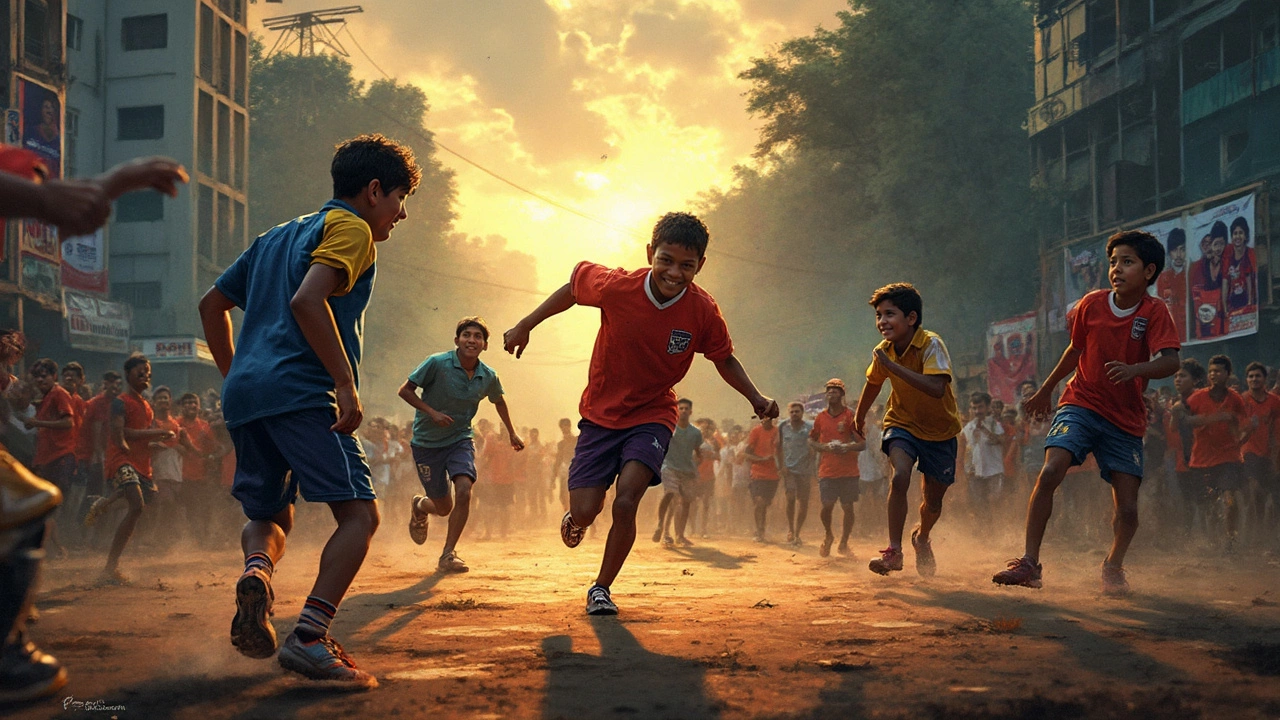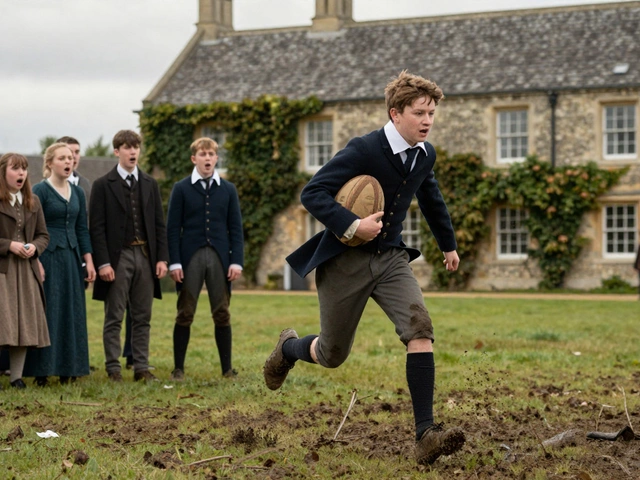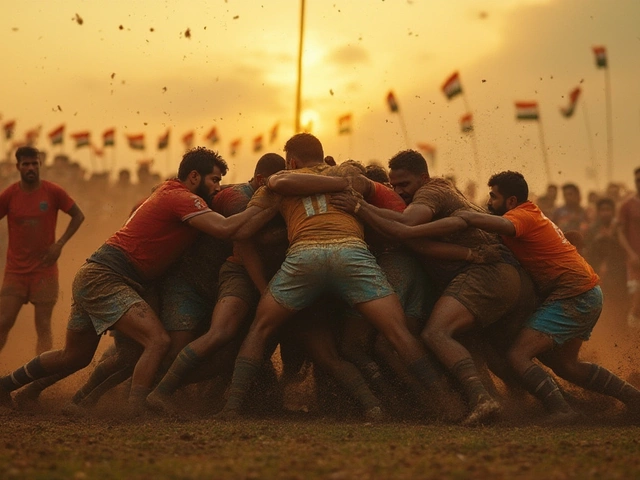Ever noticed how rugby barely gets a mention on sports highlights, while football and basketball run the show? There's a reason why rugby isn't packing stadiums or dominating sports channels, even though it's action-packed and rewards pure grit. If you've tried catching a live fixture, you probably noticed the lack of hype compared to other major sports. The energy is real, but where’s the buzz?
For a lot of fans, just finding out when the next big rugby game kicks off can be a challenge. The fixture lists are tricky, scattered across different leagues and countries, and the schedules seem more confusing than helpful. Want to follow your team but live in a place where rugby isn’t king? Good luck finding decent streaming or even news updates. Stick around, and you'll see what’s really keeping rugby off the main stage—and pick up some ideas to get the most out of the games you can find.
- Rugby’s Beginnings: Where Did It Fall Behind?
- How Rugby Fixtures Affect Exposure
- Competition from Other Sports
- Media Coverage and Accessibility
- How to Get More Out of Rugby Fixtures
Rugby’s Beginnings: Where Did It Fall Behind?
Rugby has roots almost as old as football, with the split happening way back in 1823 when a student at Rugby School in England picked up a soccer ball and ran it across the line. That’s basically the moment rugby was born. While it quickly grew in places like the UK, New Zealand, Australia, and South Africa, it didn’t spread everywhere fast.
Here’s the thing—while soccer (or football, depending where you’re from) was making its way into every country thanks to colonialism, easy rules, and barely any gear needed, rugby stayed more of a niche sport. Part of the problem was how intense the game was. Rugby is rough, you need a big team, specific fields, and the rules weren’t easy to just pick up in a day.
By the early 1900s, soccer had zoomed ahead, leaving rugby behind. Countries without strong British ties just didn’t get into rugby much. Meanwhile, the US was busy cooking up American football. Even within the UK, a big argument over professionalism split rugby into two codes—Rugby Union and Rugby League—which only muddied the waters for new fans.
Check out how quickly some sports took off compared to rugby:
| Sport | Year Popularized | Number of Countries Playing by 1950 |
|---|---|---|
| Soccer (Football) | 1863 | 120+ |
| Basketball | 1891 | 75+ |
| Rugby | 1823 | 30+ |
So, with a late start in most countries and a confusing setup between union and league, rugby missed the global spotlight. It’s big in a handful of countries, but nowhere near as widespread as rugby fans wish it was.
If you’re wondering why the sport’s popularity took a hit, just imagine schools, playgrounds, and media focusing attention elsewhere while rugby was still sorting out its own identity. Sadly, that early gap is still hard to close today.
How Rugby Fixtures Affect Exposure
Getting people hyped about rugby starts with one simple thing: actually knowing when the games are on. But here’s the snag—rugby fixtures are all over the place. Unlike the NBA or NFL, where the season has a clear structure and you know when your team is playing every week, rugby leagues often overlap across the world. Some tournaments, like the Six Nations or Rugby Championship, run for just a couple of months. Others, like club leagues (Premiership Rugby, Top 14), drag out for most of the year, but the match dates jump around due to international games and cup clashes.
This scattered setup messes up the rhythm for fans. Imagine trying to follow your local club, only to discover the schedule’s changed last minute because one of your team's stars got called up for national duty. Compare that to the Premier League, where matches happen almost like clockwork every weekend. Fans plan around that. With rugby, it’s a guessing game.
Here's a quick look at how top rugby competitions schedule their seasons:
| Competition | Season Duration | Fixtures Frequency |
|---|---|---|
| Six Nations | Feb - Mar | Every weekend |
| Rugby Championship | Aug - Oct | Bi-weekly |
| Premiership Rugby (UK) | Oct - June | Irregular (due to international breaks) |
| Super Rugby (Southern Hemisphere) | Feb - June | Weekly |
Because of this unpredictable calendar, even hardcore fans have to hunt for updates online. The average sports fan will just move on to something less confusing. If you care about rugby growing, fixture consistency is non-negotiable.
Want to actually keep up? Here’s what helps:
- Subscribe to official club or league calendars—most websites let you add fixtures to your phone or laptop.
- Follow reliable rugby news channels on social platforms. They usually post fixture reminders and last-minute changes.
- Look up streaming schedules early. Some matches aren’t broadcast in every region, so knowing ahead saves the hassle.
Bottom line: scattered fixture lists make rugby hard to follow. Giving fans better, easier tools to track games could make a huge difference for the sport’s popularity.

Competition from Other Sports
It's tough for rugby to break through when it's surrounded by giants like football, basketball, and even cricket in some countries. In places like England or New Zealand, rugby rules, but in the US, it's no contest—American football eats up the attention and funding. The same goes for most European countries, where soccer (football) is a way of life. There just isn't much space left in the sports calendar, or in people's heads, for another heavy-contact sport.
Look at TV deals and sponsorships. The rugby union's biggest competition, the Rugby World Cup, brings in millions of viewers globally, but nowhere near the numbers of the FIFA World Cup or the NFL Super Bowl. In 2019, the Rugby World Cup final drew about 44.9 million worldwide, while the FIFA World Cup final in 2022 pulled in a jaw-dropping 1.5 billion. It’s a huge gap. Here’s a quick comparison to see how rugby stacks up:
| Event | Estimated Global Viewers |
|---|---|
| FIFA World Cup Final (2022) | 1.5 billion |
| Super Bowl LVII (2023) | approximately 115 million |
| Rugby World Cup Final (2019) | 44.9 million |
Even when it comes to grassroots support, rugby lags. For example, in the United States, over a million high school athletes play football, but fewer than 50,000 play rugby. Pro leagues reflect this too: the NFL and NBA both rake in billions in revenue, while pro rugby leagues are still trying to get solid footing outside traditional strongholds like England, France, and New Zealand.
What's this mean for fixtures and fans? Squeezing rugby games in between packed calendars of football, cricket, and basketball isn't just a headache for fans—it also means broadcasters give them less attention, making it even harder for new fans to jump in. If your local pub is showing three different soccer matches on Saturday, odds are the big rugby clash won't even make the screen.
Want to catch more rugby where it actually exists? Here are a few tips:
- Check for rugby-specific bars or clubs in your area—they often know the schedule and have streaming options.
- Look up international broadcasters like Sky Sports or beIN Sports, as they carry most top-tier fixtures.
- Try official league websites or apps for schedule updates, replays, and highlight reels.
Media Coverage and Accessibility
Media coverage is probably the biggest hurdle for rugby. If you look at the TV schedules in places like the US and most of Europe (outside the UK and France), rugby matches hardly make the list. You might have to dig deep into pay-per-view channels or hope for a special event just to catch a fixture. Compare that to football, which seems to be everywhere—basic cable, streaming, and even social media clips.
One reason for this is simple: viewer numbers. Broadcasters are all about ratings. For example, the 2023 Rugby World Cup Final attracted around 17 million viewers globally. To put that in perspective, the 2023 FIFA World Cup Final pulled in more than 1.5 billion. With numbers like that, networks see rugby as a niche rather than a headline act.
The problem gets worse if you love watching your local club. Fixture times shift a lot, and there’s no one channel or service covering everything. Rugby fans in the U.S. deal with weird time differences, and rugby isn't part of mainstream school or college sports broadcasts. And even in top rugby nations like New Zealand or South Africa, it’s mostly big international games that get prime-time slots.
Here's a simple breakdown of sports broadcast reach based on a few key events in 2023:
| Sporting Event | Estimated Global Viewers |
|---|---|
| FIFA World Cup Final | 1.5 Billion |
| Super Bowl | 110 Million |
| NBA Finals Game 7 | 45 Million |
| Rugby World Cup Final | 17 Million |
Even with streaming services now everywhere, rugby’s not nearly as easy to watch as other sports. You might have to pay for different subscriptions just to keep up with your team’s games. Plus, a lot of rugby highlights or talk shows tend to fly under the radar, so fans have to work harder for news or stats about fixtures.
If you want to keep up without losing your mind, here are some tips:
- Check the official sites or social pages for your favorite rugby clubs—they post accurate fixture times and where to watch.
- Try all-in-one sports streaming platforms, like ESPN+ in the U.S. or Sky Sports in the UK, which often carry the big games.
- Look for fan-driven forums and apps—you’d be surprised how much info the community puts together, from livestream links to fixture predictions.
The gap in mainstream rugby visibility isn’t just about tradition—it’s a struggle with media priorities and access. Until that shifts, rugby fans have to be a bit savvier to enjoy the action regularly.

How to Get More Out of Rugby Fixtures
If you’re a rugby fan, you already know checking the rugby fixtures page is a must. Fixtures list out all the games, who’s playing, and when. But it can feel like a maze, especially with so many leagues—Premiership, Top 14, URC, Super Rugby. Most fans outside traditional countries like England, New Zealand, or South Africa don't get live games on TV at all, let alone full fixture lists easily.
To make it simple, here’s what you can do to stay on top of the action and actually enjoy more matches:
- Bookmark the best sites: Official league websites—like Premiership Rugby, Super Rugby Pacific, and the United Rugby Championship—update fixtures weekly. Sites like BBC Sport or ESPN also have tidy rugby fixture calendars.
- Try rugby apps: Apps like Ultimate Rugby or RugbyPass list scores, fixtures, and breaking news in one place. Some even let you customize alerts by team or competition so you don’t miss a match.
- Join local rugby clubs: Even if you can’t play, local clubs usually post up-to-date fixtures and sometimes organize group viewings or live streams. It’s a good way to meet people as into rugby as you are.
- Time zone hacks: Rugby is played worldwide, so games might kick off at weird times for you. Google Calendar and TimeAndDate.com let you plug in fixtures and convert match times to your own time zone so you’re not guessing whether that's a morning or midnight game.
- Look for streaming deals: Rugby coverage is often hidden behind paywalls, but streaming platforms sometimes offer free trials around big games—like the Six Nations or World Cup. World Rugby’s official YouTube channel streams some lower-profile games live and posts highlights fast.
Just for a snapshot, here’s how often some major rugby leagues schedule their fixtures:
| Competition | Season (months) | Total Fixtures (2024-25) |
|---|---|---|
| Premiership Rugby | Sep - Jun | 135 (regular season) |
| Super Rugby Pacific | Feb - Jun | 91 |
| United Rugby Championship | Oct - Jun | 144 |
| Top 14 (France) | Aug - Jun | 182 |
| Six Nations | Feb - Mar | 15 |
Rugby might not be top dog on TV, but with a bit of strategy, you can catch more games, link up with fellow fans, and even keep up with scores in real time. The more you know about the fixture rhythm, the more rugby you’ll actually get to watch—or even plan a trip around the next big derby.





